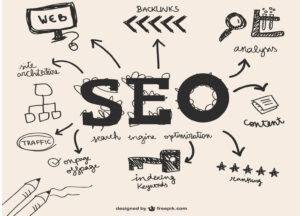Mastering SEO with ChatGPT: Simplify, Enhance, and Captivate
I. Understanding SEO
A. What is SEO?
Key components of SEO include:
- On-page SEO: Focuses on content and HTML source code, optimizing elements like title tags and meta descriptions.
- Off-page SEO: Involves external factors, such as backlinks and social media presence, influencing search rankings.
- Technical SEO: This ensures that a website meets technical requirements such as site speed, mobile friendliness, and indexing.
B. The Role of Keywords in SEO
Keywords are the phrases or terms that users enter into search engines. Conducting thorough keyword research is fundamental, as it helps identify what your audience is searching for. Understanding keyword significance can provide a guide toward optimizing your content effectively.
There are mainly two types of keywords:
- Short-tail keywords: Generally consist of one or two words and have a high search volume, often leading to competitive landscapes.
- Long-tail keywords: Phrases with three or more words; they may generate less traffic but often lead to higher conversion rates due to their specificity.
Tools such as Google Keyword Planner, SEMrush, and Ahrefs can aid in discovering effective keywords tailored to your niche.
C. The Importance of Content Quality
Quality content is critical for achieving higher SEO rankings. Search engines favor content that is informative, relevant, and engages users. Creating valuable content can attract backlinks, improve dwell time, and reduce bounce rates, contributing positively to SEO performance.
Best practices for crafting valuable content include:
- Providing thorough information and answering users’ queries.
- Incorporating visuals, such as images and infographics, to enhance user experience.
- Regularly updating content to maintain freshness and relevancy.
II. Leveraging ChatGPT for Content Creation
A. Generating Ideas with ChatGPT
Using ChatGPT for brainstorming content topics can streamline your creative process. Here are some effective techniques:
- Prompts: Start with questions or themes relevant to your niche.
- Keywords: Input your target keywords and ask for topic ideas based on them.
- Trends: Discover trending subjects by asking for insights on current events or popular themes in your field.
Once you gather ideas, refine them into actionable content strategies, considering your audience’s preferences and needs. For instance, a recent success story could be a blog that pivoted its content based on trending queries identified by AI analysis.
B. Crafting Engaging Blog Posts
Structuring your blog posts effectively is essential to retain reader engagement:
- Headings: Use clear headings and subheadings to guide readers through the content.
- Introduction: Start with a hook to capture interest and outline what the reader can expect.
- Conclusion: Summarize key points and encourage further engagement.
ChatGPT can assist with outlining and drafting by providing paragraph suggestions based on the structure you provide. Additionally, aim to incorporate your keywords seamlessly within the text for better visibility without sacrificing readability.
C. Enhancing Existing Content
Regularly updating existing content can convert stagnant posts into SEO powerhouses. ChatGPT can help by:
- Providing suggestions for new information or trends to include.
- Offering insights on keyword optimization.
- Helping to rephrase and refresh content to align with user intent.
Monitoring content performance using tools like Google Analytics can reveal areas for improvement, allowing you to adjust and optimize effectively.


III. Optimizing Content for Search Engines
A. On-Page SEO Techniques
Effective on-page SEO involves several essential elements:
-
- Titles: Should be engaging and include primary keywords.
- Meta Descriptions: Offer a brief overview of the content while enticing users to click on your link.
- Headers: Organizing content with headings (H1, H2, H3) enhances readability and helps search engines understand your content’s structure
Additionally, employing multimedia elements such as images can create a better user experience and engagement.
B. Off-Page SEO Strategies
Building a robust backlink profile is vital in strengthening your site’s authority. Key strategies include:
- Guest Posting: Contributing articles to reputable sites can generate backlinks and exposure.
- Social Media: Sharing content across social platforms can drive traffic and enhance brand visibility.
- Partnerships: Collaborating with influencers or other brands can lead to mutual growth and backlink opportunities.
C. Technical SEO Essentials
Technical SEO ensures that your website is optimized for crawling and indexing. Common components include:
- Site Speed: Ensuring quick load times for an optimal user experience.
- Mobile Optimization: With increasing mobile searches, having a mobile-friendly site is crucial.
- Secure Sockets Layer (SSL): Implementing SSL can enhance data security, which is favored by search engines.
Use tools like Screaming Frog and Google Search Console to identify and address technical issues.
IV. The Future of SEO with AI
A. Trends Shaping SEO
- Current trends indicate a shift towards voice search and mobile optimization. These developments require marketers to adapt their SEO strategies to cater to changing user behaviors. Emphasizing local SEO can also capture users searching for nearby services.
B. Role of AI in Content Optimization
- AI tools, including ChatGPT, have transformed content creation by providing insights and facilitating the writing process. However, challenges exist, such as ensuring the content genuinely reflects the brand and adheres to ethical standards.
C. Preparing for Future Developments
- To remain competitive in SEO, marketers should focus on continuously developing key skills like data analysis and content creation. Emphasizing adaptability and ongoing education is vital in an ever-evolving digital landscape.
V. Practical Tips for Getting Started
A. Setting Up Your SEO Strategy
Developing a comprehensive SEO plan involves several steps:
- Goal Setting: Define clear objectives for your SEO efforts.
- KPIs: Establish KPIs to measure success effectively.
- Content Calendar: Creating a content calendar helps streamline the process and maintain consistency.
B. Tools and Resources for SEO Mastery
Here are some recommended tools:
- Keyword Research: Google Keyword Planner, Ahrefs.
- Analytics: Google Analytics, SEMrush for tracking performance.
- Education: Online courses from platforms like Coursera or community forums for peer support.
C. Common Mistakes to Avoid
Some frequent missteps include:
- Neglecting mobile optimization, leading to poor user experience.
- Overlooking meta descriptions and titles, which can impact click-through rates.
- Failing to regularly update content, risking irrelevance.
Encouraging a culture of experimentation will allow you to learn from missteps and refine your strategies.
Conclusion
Mastering SEO isn’t just about understanding search engines; it’s about continuously adapting your strategies to engage users meaningfully. The integration of AI tools like ChatGPT can vastly enhance your content creation process while ensuring quality remains at the forefront. Remember, the journey of mastering SEO is ongoing, filled with opportunities for learning and growth.
Follow us

